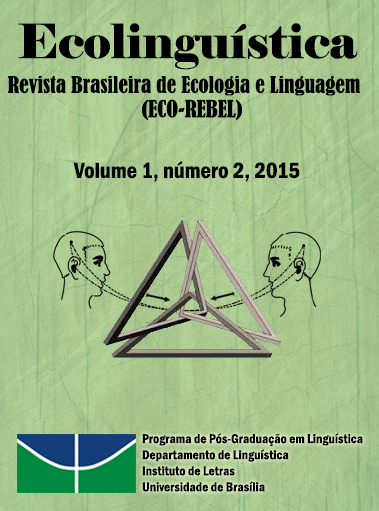Língua, cultura, religião e nação no mundo e no Brasil
Keywords:
Language, culture, religion, standard, nation-state.Abstract
The objective of this article is to suggest a reflection about language, culture, and nation in Brazil and in the world, from the historical and present-day point of view. It was written by the teacher of French that I am, what legitimizes the election of European and especially French examples and sources I make use of. However, due to the fact that systemic studies aim at having a scientific character, it is possible that the conclusions have a general validity, without losing a certain specificity. My only intention is to attempt at contributing with the on-going debate in this area of human sciences, as is the case with the young discipline Ecolinguistics.
Downloads
References
ANDERSON, B. Imagined communities. London/New York: Verso, 2000.
AUROUX, S. A revolução tecnológica da gramatização. Campinas: Editora da Unicamp, 1994.
BEN JEMIA, M. N. La langue des derniers musulmans de l’Espagne. Tunis: Publications de l’Université de Tunis, 1987.
DORLIN, E. Sexe, race, classe; pour une épistémologie de la domination. Paris: PUF, 2009.
DORLIN, E. La matrice de la race: généalogie sexuelle et coloniale de la Nation française. Paris: La Découverte, 2006.
FREIRE, J. B. Rio Babel. A história das línguas na Amazônia. Rio de Janeiro : Atlântica, 2004.
GEARY, P. Quand les nations refont l’Histoire. L’invention des origines médiévales de l’Europe. Paris : Flammarion, 2004. (The Myth of nations. The medieval origins of Europe. Frankfurt am Main : Taschenbuch Verlag, 2002).
GELLNER, P. Nations et nationalismes. Paris :Payot, 1999. (Nations and Nationalism. Oxford: Basil Blackwell, 1983).
HAGÈGE, C. Le soufflé de la langue. Paris : Odile Jacob, 2000.
JOSEPH, J. E. Language and Identity. National, Ethnic, Religious. Basingstoke e Nova Iorque : Palgrave Macmillan, 2004.
HOBSBAWM, E. J. Ages of Extremes : The Short Twentieth Century, 1914-1991. Londres : Michael Joseph Ltd, 1994.
JERAD, N. La publicité, un champ pour un nouvelle lecture du contact de langues ai Maghreb. Rio de Janeiro : GIEL, 2012 (Ã paraître).
KLINKENBERG, J. M. La langue et le citoyen : pour une autre politique de la langue française. Paris : PUF, 2001.
LIMA, S. B. A língua portuguesa e a unidade do Brasil. Rio de Janeiro : Nova Fronteira, 2000 (1981).
MAALOUF, A. Le dérèglement du monde. Paris : Grasset, 2009.
MERLIN-KAJAN, H. La langue est-elle fasciste ? Langue, pouvoir, enseignement. Paris : Seuil, 2003.
MICHAELS, B. W. La diversité contre l’égalité. Paris : Liber/Raisons d’agir, 2009.
REYNAUD-PALIGOT, C. De l´identité nationale. Science, race et politique en Europe et aux Etats-Unis XIXe-XXe siècle. Paris: PUF, 2011.
RIBEIRO, D. O povo brasileiro : a formação e o sentido do Brasil. São Paulo : Companhia das Letras, 1995.
SAID, E. Orientalismo: o Oriente como invenção do Ocidente. São Paulo: Companhia das Letras, 2001.
SAND, S. Comment le peuple juif fut inventé. Paris : Fayard, 2008.
SÉNAC, R. L´invention de la diversité. Paris: PUF, 2012.
WEIL, P. Liberté, égalité, discriminations: l’identité nationale au regard de l’Histoire. Paris: Gallimard, 2009.
ZIMMER, O. A Contested Nation. Cambridge: Cambridge University Press, 2003.
Downloads
Published
How to Cite
Issue
Section
License
Authors who publish in this journal agree to the following terms:
Authors retain copyright and grant the journal the right of first publication. The work is simultaneously licensed under the Creative Commons Attribution License allowing the sharing of the work with acknowledgment of the authorship of the work and initial publication in this journal.
Authors are authorized to enter into additional contracts separately for non-exclusive distribution of the version of the work published in this journal (e.g., publishing in institutional repositories or as book chapters), with acknowledgment of authorship and initial publication in this journal.
Authors are allowed and encouraged to post and distribute their work online (e.g., in institutional repositories or on their personal page) at any point before or during the editorial process, as this can bring about productive revisions as well as increase impact.
Citation of published works (See The Effect of Free Access).



3.png)



